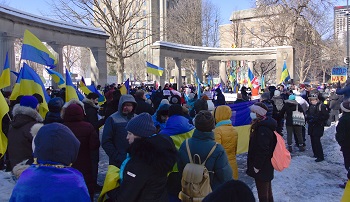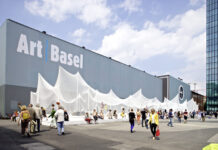
The Shadow of the war
The war in Ukraine is seriously damaging Putin’s popularity. Young and old show up at the collection points and realize that they must quickly and at their own expense put together their own survival kit. Actually, the army cannot provide it. A very bad matter.
Understandingly, grlfriends, wives, mothers, who may be have already lost a relative in Chechnya between ’94 and ’96, shed tears in the railway stations from which convoys leave for the west of the country. Suddenly war appears close in the big cities that until yesterday had experienced the usual boring but quiet routine of Putinian Russia. The idea of a total mobilization on the upcoming winter is a real nightmare which shakes everyone’s dreams.
A crushed unity
But somebody invents his/her own way to say no to such claim. Many flee abroad (194,000 until 27/09 according to the following AP News article); others are in hiding, others go on protesting in the streets and the police arrest them. But perhaps the real novelty lies in the refusal of ethnic minority groups to fight for the Holy Mother Russia. The riots in Daghestan cannot fail to worry Putin’s men.
Up to now the cohesion of the great country had not been questioned. But now it is Putin himself who accuses the West of trying to break up Russia. Is this the sign of a growing protest against the Moscow order triggered by the war? What is certain is that the local officials, obliged to enforce the call to arms, do not react with sympathy to the tenants of the Kremlin.
The referendum of the occupied Areas and the European reaction
Anyway, the situation of the Ukrainians is much more difficult, as they live in the areas occupied by the Russians and who were annexed to Moscow by the referendum. Based on reliable information released by the BBC, groups of recruiters take note of the men living in the villages in order to put them on the front line as cannon fodder against their Ukrainian countrymen. The situation looks highly dramatic and Kiev is aware of it.
Meanwhile, the European Union continues with its hammering of sanctions. According to reliable sources, many countries are willing to ban the movement in the EU of travellers who, for whatever reason, come from Russia or are in possession of a Russian passport. This would also mean to prevent those who go to third countries from goring there and then entering Europe. Moscow’s isolation would become even tougher.
L’ombra della guerra
La guerra in Ucraina nuoce gravemente alla popolarità di Putin. Giovani e meno giovani si presentano ai punti di raccolta e si sentono dire che devono provvedere a proprie spese e alla svelta a mettere insieme un proprio kit di sopravvivenza, perché l’esercito non può fornirglielo.
Come segnale di prima accoglienza non c’è male. Fidanzate, mogli, madri, alcune delle quali hanno già perso un congiunto in Cecenia fra il ’94 e il ‘96, versano lacrime più che giustificate nelle stazioni ferroviarie dalle quali partono i convogli verso l’Ovest del Paese.
Improvvisamente la guerra appare vicina nelle grandi città che fino a ieri avevano vissuto il solito trantran noioso ma tranquillo della Russia putiniana. L’incubo di una mobilitazione totale alle porte dell’inverno agita i sonni di tutti.
L’unità spezzata
Ma ci sono anche quelli che dicono di no in diversi modi. Molti fuggono all’estero (194.000 fino al giorno 27/09 secondo il seguente articolo di AP News), altri si nascondono, altri ancora protestano nelle strade e sono arrestati dalla polizia. Ma forse la vera novità consiste nel rifiuto dei gruppi etnici minoritari di combattere per la Santa Madre Russia.
I tumulti nel Daghestan non possono non preoccupare gli uomini di Putin. Fino ad oggi non si era messa in discussione la coesione del grande Paese. Ma adesso è lo stesso Putin ad accusare l’Occidente di voler disgregare la Russia.
È il segno del crescere di una protesta contro l’ordine di Mosca, di cui la guerra rappresenta la miccia ? Non lo sappiamo ancora, ma è certo che i funzionari locali, obbligati a far rispettare la chiamata alle armi, non guardano con simpatia agli inquilini del Cremlino.
I referendum delle aree occupate e la reazione Europea
Molto più difficile è invece la situazione degli ucraini che vivono nelle zone occupate dai russi che con i referendum sono state annesse a Mosca. Sulla base di informazioni sicure divulgate dalla BBC, gruppi di reclutatori prendono nota degli uomini che vivono nei villaggi allo scopo di metterli in prima linea come carne da cannone contro i loro connazionali ucraini. La situazione sarebbe altamente drammatica e Kiev non lo nasconde.
Nel frattempo l’Unione Europea continua con il suo martellamento di sanzioni. Secondo fonti affidabili molti Paesi sarebbero disposti a vietare la circolazione nella UE di viaggiatori che, a qualunque titolo, provengono dalla Russia o sono in possesso di un passaporto russo. Ciò servirebbe a tagliare la strada anche a coloro che si recano in Paesi terzi e poi fanno il loro ingresso in Europa. L’isolamento di Mosca diventerebbe ancora più duro.







